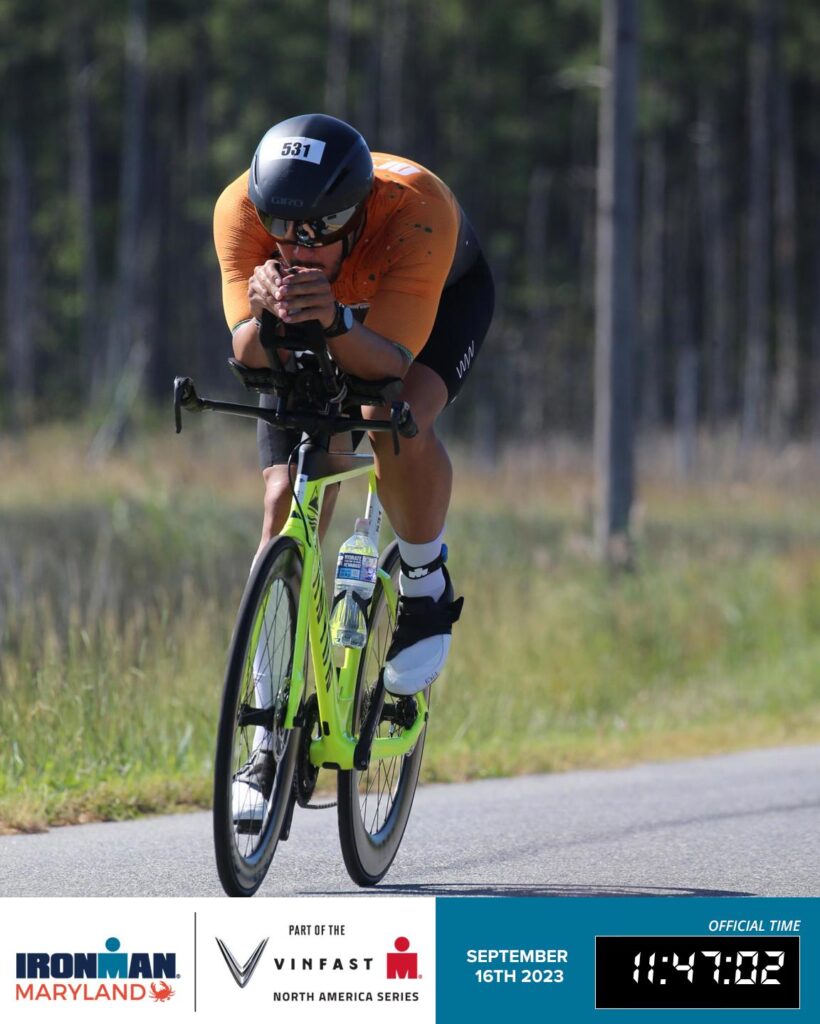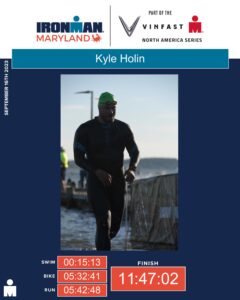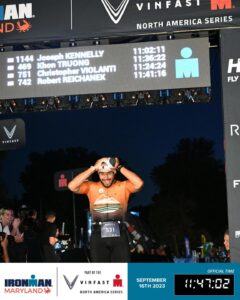
Huge congratulations to our coworker, Kyle Holin, who did his first Ironman! To break that down, this means Kyle swam 2.4 miles, bicycled 112 miles, and ran a 26.22-mile run. That’s a total of 140.6 miles! What exactly does it take to become an Ironman?
Training
No one wakes up one day and just decides to do an Ironman. Keep in mind that this isn’t like training for any regular marathon. To do one safely, you’ll need to do endurance training for three different sports. Doing any of them would be exhausting, but all three in one day require years of training. That usually includes marathons and long-distance triathlons. It means sacrificing free time to swimming, running, and bicycling, with constant attention to performance and consistency.
On top of that, the athletes have to do the race without any headphones. Ironman forbids personal music devices because the race is also partly about the mental challenge of being left alone with your own doubts. Physical exhaustion aside, not everyone can handle the silence of being alone with their own thoughts while also pushing themselves to extremes.
“Your body drives you to the finish line, but your mind makes you cross it.”
– Sebastian Kienle, 2014 Ironman world champion
Life Long Results
Besides the amazing rush of finishing an Ironman, the athletes will carry that focus and confidence with them for the rest of their lives. Ironmen can take that mental focus and work ethic to other aspects of their lives. They already learned how to deal with and overcome obstacles that feel overwhelming. While this major accomplishment requires strong dedication and an intense work ethic, they then take that with them throughout the rest of their lives. When we heard that our coworker Kyle had pulled this off, we just had to ask him about it!
What was your inspiration for doing this?
I got into triathlon during Covid. I was big into mountain biking prior to the pandemic and once everything shut down, is when I decided to start running. Very much like the scene in Forest Gump. The first real hit of “Runners High” got me hooked.
I had a lot of different things that motivated me in the beginning. But after a while, that motivation turns into consistency. And then the consistency turns into a habit. When I started this training, my main goal was always to do this “Full Ironman” distance of 140.6 miles. But my thought process was to start with a few “half ironman” races to get welcomed into the sport. A Half Ironman is 70.3 miles which consists of a 1.2-mile swim, 56-mile bike, and 13.1-mile run. Since 2021, I have done 5 half Ironmans, 3 marathons, and a few other smaller endurance races to get ready for my first full Ironman.
What was your biggest takeaway from it?
It has been 10 days since the race and I am still learning things from that day. But the biggest one I would say is a whole new perspective of myself and how I go about my life. I dedicated years to that day. So many hours, miles, sacrifices. You literally have to train for 3 sports. But you also need to focus on sleep and diet which I became a master of. I truly believe Triathlon is 5 disciples when you include sleep and diet. And to walk away healthy with a result better than my goal still shocks me. I always knew I was very mentally tough because of how I handled hardships during my childhood and young adulthood. But to see how I overcame so many obstacles during those 12 hours really highlighted my mental toughness. I dealt with a flat tire on the bike, severe stomach cramping during the WHOLE marathon, and some very DARK mental places. But I was able to throw all that hurt out of my mind, body, and soul to cross a finish line I have been dying to cross for 3 years.
I believe when you choose to do hard things, you not only walk away as a better human, but you learn so much about yourself. You stop worrying about the small, uncontrollable things.
What would you say or advise people about training for one?
Have a why. I think in life you need a why for almost everything you do. But specifically for triathlon training, you need a STRONG why and multiple. The reason the why is important is because there are days when your why is the only deciding factor if that workout on a Tuesday after 8 hours of work is going to happen. When I have hard days at work and then I have to go sit on my bike for 3 hours in my house, I think of my why, and 9.5/10 times, it allows me to get in the work.
What makes training for a full Ironman different from training for a half?
The biggest difference is time. During this training block, I was training anywhere from 16-20+ hours a week. Where in a half, the max you would hit is around 15 hours per week. But if you have a good coach who understands the sport and the body/recovery, those 20-hour weeks do not feel that bad!
Do you plan on doing another Ironman? Any in particular?
Yes! I am doing another half ironman in Indian Wells California this December. I am attempting to finally break a 6-hour finish time. I have failed at that goal in my last 2 half-ironman races and I refuse to fall short again.
Congratulations to Kyle again on becoming an Ironman!
“If you set a goal for yourself and are able to achieve it, you’ve won your race.”
-Dave Scott, six-time Ironman world champion

